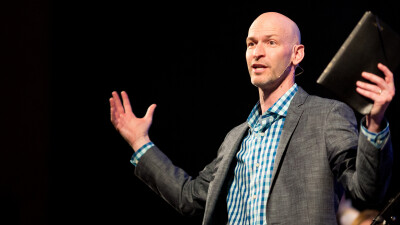Emotions are good but can be a tricky thing.
On one hand, we can become obsessed and enveloped by them, losing all perspective. On the other, we can repress and shove them inside us, only to leak out in unhealthy ways. In either case, we can be driven by them no matter how well intended, either consciously or unconsciously. So, how do we become spiritually formed instead? All this stuff is interesting and encouraging to me.
That is what I am touching on every Wednesday night at a small roundtable, where over a hundred folks from our local church body, Eagle Church, gather in groups of 7-8 to discuss and pray through “ daily offices” (devotionals) and discuss developing emotional healthy relationships. We’re guided through a workbook by Pete and Geri Scazzero, the founders of the growing “Emotionally Healthy Spirituality (EHS)” movement. The season that our church is in is called Emotional Healthy Relationships or EHR. The methodology behind this specific curriculum is opening up small-group dialogue about how we relate to others; the primary goal is to know thyself first as Christ might know us, and secondary goal is to use the proper tools-of-change in navigating our relationships.
As part of the curriculum, we took assessments to gauge our level of emotional health; there are four stages: emotional infant, emotional child, emotional adolescent and emotional adult. When I took the EHR assessment survey I started off as a strong adult and quickly slipped into classical emotional adolescent by the end. I have some work to do like everyone else discovered for themselves.
For those of you curious, these are excerpts from the workbook:
Emotional adolescent. I don’t like it when others question me. I often make quick judgments and interpretations of people’s behavior. I have trouble really listening to another person’s pain, disappointment or needs without being preoccupied with myself. I unconsciously keep records on the love I give out.
Emotional adult. I respect and love others without having to change them or becoming judgmental. I value people for who they are, not for what they can give or how they behave. I take responsibility for my own thoughts, feelings, goals and actions. I can state my own beliefs and values to those who disagree with me without becoming adversarial.
The adolescent results were a little surprising to me, and I learned that I have a high impression of myself and thus gained some proper humility about my work ahead of me. That said, I don’t necessarily see this assessment, or most assessments, as realistic or accurate depictions of my total self over a lifetime; one’s assessment results could change week to week, and of course anyone could manipulate answers in a certain way to create a certain persona. So, as with most other self-studies go, this one assumes we are all on a sincere journey.
But regardless, the results have sparked for myself and for my group a healthy dialogue about our relationship to emotions and to others. Our group text-thread is often buzzing with texts and updates from people about various emotional upheavals they are experiencing throughout the week.
As a more philosophically minded man, I tend to see feelings as “mushy junk” that I have to be careful of less they start to dominate me or my relationships. But from various life-experiences I’ve also learned, as a friend pointed out, that swinging to the opposite extreme does not solve the problem. Denying your emotions merely pushes them further deep within you; it’s only a matter of time before they manifest and are unleashed in other usually undesirable ways. In fact, one of the key insights from this EHR course is through acknowledging, facing and asking questions about how we relate to others and the emotions that arise, we can gain better awareness of our inward processing and relate better to others. Getting this pattern down is essential to good EHR. The goal of the course is not to have perfect relationships, but to develop skills to navigate the sticky, messy and imperfect relationships in our lives—and to find a sense of fulfillment and peace amidst the process.
